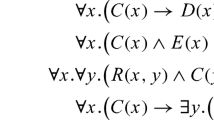Abstract
A formal device is said to be adaptive whenever its behavior changes dynamically, in a direct response to its input stimuli, without interference of external agents, even its users. In order to achieve this feature, adaptive devices have to be self-modifiable. In other words, any possible changes in the device’s behavior must be known at their full extent at any step of its operation in which the changes have to take place. Therefore, adaptive devices must be able to detect all situations causing possible modifications and to adequately react by imposing corresponding changes to the device’s behavior. In this work, devices are considered whose behavior is based on the operation of subjacent non-adaptive devices that be fully described by some finite set of rules. An adaptive rule-driven device may be obtained by attaching adaptive actions to the rules of the subjacent formulation, so that whenever a rule is applied, the associated adaptive action is activated, causing the set of rules of the subjacent non-adaptive device to be correspondingly changed. In this paper a new general formulation is proposed that unifies the representation and manipulation of adaptive rule-driven devices and states a common framework for representing and manipulating them. The main feature of this formulation is that it fully preserves the nature of the underlying non-adaptive formalism, so that the adaptive resulting device be easily understood by people familiar to the subjacent device. For illustration purposes, a two-fold case-study is presented, describing adaptive decision tables as adaptive rule-driven devices, and using them for emulating the behavior of a very simple adaptive automaton, which is in turn another adaptive rule-driven device.
Access this chapter
Tax calculation will be finalised at checkout
Purchases are for personal use only
Preview
Unable to display preview. Download preview PDF.
Similar content being viewed by others
References
ALMEIDA JUNIOR, J. R. STAD-Uma ferramenta para representação e simulação de sistemas através de statecharts adaptativos. São Paulo 1995, 202p. Doctoral Thesis. Escola Politécnica, Universidade de São Paulo.[In Portuguese]
BASSETO, B.A.; JOSE NETO, J. A stochastic musical composer based on adaptive algorithms. Anais do XIX Congresso Nacional da Sociedade Brasileira de Computaç~ao. SBC-99 PUC-Rio, Vol 3, pp105–13, 19 a 23 de julho de 1999.
BURSHTEYN, B. Generation and recognition of formal languages by modifiable grammars. ACM SIGPLAN Notices, v. 25, n. 12, p. 45–53, 1990.
CABASINO, S.; PAOLUCCI, P.S.; TODESCO, G.M. Dynamic parsers and evolving grammars. ACM SIGPLAN Notices, v. 27, n. 11, p. 39–48, 1992.
Christiansen, H. A survey of adaptable grammars. ACM SIGPLAN Notices, v. 25, n. 11, p. 33–44, 1990.
IWAI, M. K. Um formalismo gramatical adaptativo para linguagens dependentes de contexto. São Paulo 2000, 191p. Doctoral Thesis. Escola Politécnica, Universidade de São Paulo. [In Portuguese]
JOSE NETO, J. Contribuiçâo á metodologia de construção de compiladores. São Paulo, 1993, 272p. Thesis (Livre-Docencia) Escola Politécnica, Universidade de São Paulo. [In Portuguese]
JOSE NETO, J. Adaptive automata for context-dependent languages. ACM SIGPLAN Notices, v. 29, n. 9, p. 115–24, 1994.
JOSE NETO, J.; IWAI, M. K. Adaptive automata for syntax learning. XXIV Conferencia Latinoamericana de Informática CLEI’98, Quito-Ecuador, Centro Latinoamericano de Estudios em Informatica, Pontificia Universidad Católica Del Ecuador, tomo 1, pp. 135–146. 19 a 23 de Outubro de 1998.
JOSE NETO, J. Solving Complex Problems Efficiently with Adaptive Automata. CIAA 2000-Fifth International Conference on Implementation and Application of Automata, July 2000-London, Ontario, Canada.
PEREIRA, J. C.D; JOSE NETO, J. Um ambiente de desenvolvimento de reconhecedores sintáticos baseados em automatos adaptativos. II Brazilian Symposium on Programming Languages (SBLP’97), 3–5 September 1997, Institute of Computing, State University of Campinas, Campinas, SP, Brazil, pp. 139–50.[In Portuguese]
RUBINSTEIN, R. S.; SHUTT. J. N. Self-modifying finite automata: An introduction, Information processing letters, v. 56, n. 4, 24, p. 185–90, 1995.
SANTOS, J. M. N. Um formalismo adaptativo com mecanismos de sincronização para aplicaç~oes concorrentes. São Paulo, 1997, 98p. M.Sc. Dissertation Escola Politécnica, Universidade de São Paulo. [In Portuguese]
SHUTT, J. N. Recursive adaptable grammar. M. S. Thesis, Computer Science Department, Worcester Polytecnic Institute, Worcester MA, 1993.
WIJNGAARDEN, A. V., et al, Revised report on the Algorithmic Language Algol 68, Acta Informatica, v. 5, n. 1–3, p. 1–236, 1975.
Author information
Authors and Affiliations
Editor information
Editors and Affiliations
Rights and permissions
Copyright information
© 2002 Springer-Verlag Berlin Heidelberg
About this paper
Cite this paper
Neto, J.J. (2002). Adaptive Rule-Driven Devices - General Formulation and Case Study. In: Watson, B.W., Wood, D. (eds) Implementation and Application of Automata. CIAA 2001. Lecture Notes in Computer Science, vol 2494. Springer, Berlin, Heidelberg. https://doi.org/10.1007/3-540-36390-4_20
Download citation
DOI: https://doi.org/10.1007/3-540-36390-4_20
Published:
Publisher Name: Springer, Berlin, Heidelberg
Print ISBN: 978-3-540-00400-4
Online ISBN: 978-3-540-36390-3
eBook Packages: Springer Book Archive




